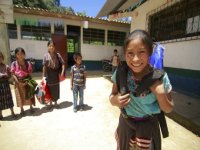5-Minute Film Festival: Teaching Kids about Global Poverty
Teaching your students about poverty and hunger can be a powerful experience for them. VideoAmy shares a series of videos that explore the issues encountered by four college students who lived on one dollar per day in Guatemala.
Your content has been saved!
Go to My Saved Content.After the Thanksgiving week, which for many in America is symbolized by bounty, excess, and consumption of all stripes, I was struck by the value of seeing how people live in less wealthy parts of the world. Living on One Dollar is a full-length documentary made by four college students who traveled to rural Guatemala to live on just a dollar a day. Upon their return, they created Living On One, a nonprofit to raise awareness and inspire action around global issues like hunger and poverty -- and started by publishing the Change Series of video shorts. I found it so compelling I've dedicated this whole film fest to it. Each episode not only succinctly frames an issue faced by people in the developing world and makes it personal, but also offers resource links to learn more -- and even better -- to do something about it.
Video Playlist: Great Resources for Teaching About Global Poverty
Watch the first video below, or watch the whole playlist on YouTube.
- Episode 1: The First Step (03:36)
The four college students start their exploration of the issue of extreme poverty by traveling to rural Guatemala and living on just one dollar a day, as 1.1 billion people around the world do.
- Episode 2: Water from a Pipe? (06:25)
Access to clean water is one of the most critical issues facing developing countries. Learn more about the global water crisis from the UN-produced video Beyond Scarcity, or donate to bring clean water to where it's needed most through charity: water or ecofiltro: one.
- Episode 3: Hunger and Tortillas (06:58)
Malnutrition is more than just not having enough to eat. Explore issues around nutrition and hunger with this video from World Vision, or buy flip-flops to support education in Guatemala.
- Episode 4: Disaster Strikes (06:37)
What resources do the rural poor have to deal with natural disaster when it hits? Learn more about how disasters affect poor people with this video by the World Bank, or donate to help people in need in Guatemala through the nonprofit Mayan Families.
- Episode 5: We Need a Job (08:03)
Having unpredictable and irregular income is another problem for people living in poverty. Watch a video about the informal economy, or take a new approach to getting kids involved in change with the Global Citizen project.
- Episode 6: Extreme Budgeting (07:27)
Managing money or getting loans for long-term goals is challenging when your income is so small. Dig deeper into the economics of poverty through the Microfinance Gateway, or support global entrepreneurs through the Whole Planet Foundation.
- Episode 7: (Not) Going to School (07:09)
Access to education is of the most powerful keys to lifting families out of poverty, but why is it so unattainable, particularly for girls? Watch a video about the value of educating impoverished girls, or donate to the United Nations Foundation's GirlUp program to send girls to school.
- Episode 8: Back in the U.S. (05:50)
Reflection is a critical part of powerful learning experiences. In this last video, the four college students share how their journey compelled them to start a nonprofit to mobilize young people to make a difference and fight extreme poverty.
More Resources for Teaching About Poverty
Beyond the few links listed above, the Change Series home page offers topic-specific resources to match each video episode, and links to organizations where you can take action. These same videos, links, and resources are available on Edmodo if you have access. You could design an amazing global awareness unit around this series, or just take one episode and dive deep into that particular issue. You'll find great resources for either approach if you dig around on the Living On One website.
The Living On One team also gives screenings and talks at schools to share their experiences and ideas for how young people can make change in the world. They're already hard at work on their next education project, which they will announce January 7th. You can stay up to date on their work by signing up for their newsletter on their website or following them on Twitter. In the meantime, here are some other great organizations with resources for helping kids understand what it means to live in poverty, both in the developing world and closer to home, and empowering them to make an impact.
- Living On One
- Kids Can Make a Difference
- Educators Toolbox -- Global Issues from National Peace Corps Association
- Resources for Schools from Heifer International (Plus, watch the Edutopia video about kids visiting Heifer Ranch.)
- Teacher Resources and Lesson Plans for Poverty from TeachUNICEF
- Lessons Plans and Resources from Teaching Tolerance
- Global Citizenship Resources from Oxfam Education
